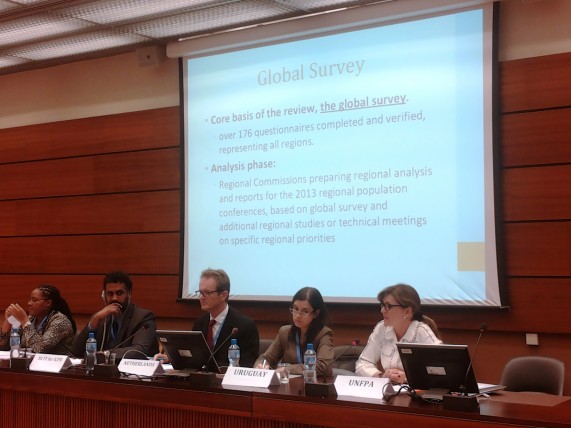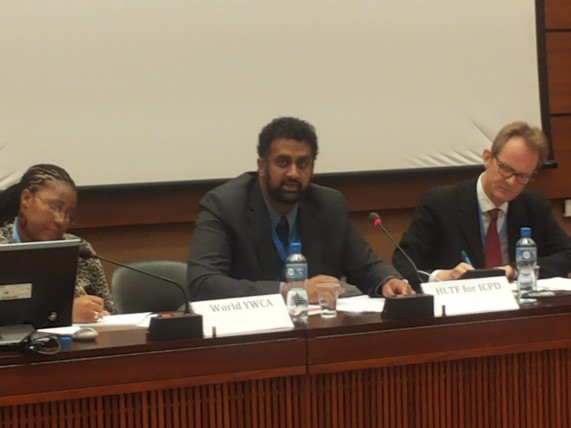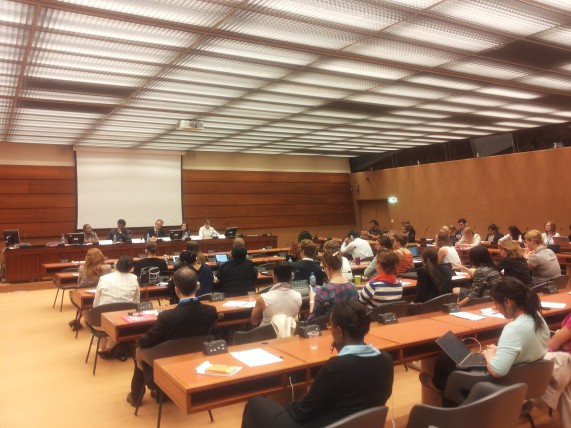SRI parallel event on SRHR at HRC23
On June 6th 2013, the Sexual Rights Initiative (SRI), in collaboration with the World YWCA, and Permanent Missions to the UN in Geneva of Finland, Mexico, the Netherlands, New Zealand and Uruguay organized a parallel event on ‘the role of the Human Rights Council in advancing sexual and reproductive rights and health in the post-2015 development agenda’. This event was held at the Palais des Nations in Geneva during the 23rd regular session of the Human Rights Council (HRC) and brought together a large number of representatives from Member States, UN agencies and civil society. The event sought to highlight advancements in international law and global policy on sexual and reproductive rights and health since the 1994 International Conference on Population and Development (ICPD) and the 1995 Fourth World Conference on Women, and discuss the role of the HRC in transferring these to the process of formulating the post-2015 development agenda.

The event was Chaired by Reinout Vos, the Deputy Permanent Representative of the Netherlands, who drew attention to State obligations to provide comprehensive sexuality education to children and young people in both formal and informal settings; to strengthen health systems through the provision of comprehensive and integrated sexual and reproductive health information and services; to train State personnel including health workers, teachers, law enforcement and judiciary on gender equality and sexual and reproductive rights issues; to eliminate discrimination and violence based on gender and sexuality; and to remove legal and regulatory barriers to the exercise of sexual and reproductive rights. He underscored the importance of ensuring that these rights were reflected in the post-2015 development agenda.
The first speaker, Dianela Pi, from the Permanent Mission of Uruguay, shared Uruguay’s experience of implementing the ICPD Programme of Action and the Millennium Development Goals (MDGs), through enactment of rights-based abortion laws, provision of comprehensive sexual and reproductive health services and sexuality education, and training of teachers. She highlighted advancements made by regional mechanisms and stressed the importance of advancing sexual and reproductive rights issues in the regional population conferences. She also welcomed the inclusion of sexual and reproductive rights in the report of the High Level Panel of Eminent Persons and reiterated Uruguay’s commitment to ensuring that these rights would have a place in the post-2015 development agenda.
Alanna Armitage, from the United Nations Population Fund (UNFPA), spoke about the Global Survey conducted as part of ICPD’s 20-year operational review, focusing on national level implementation of the ICPD PoA and priorities for the coming years. She shared that the survey attempted to gauge whether policies and programmes were human rights-based and revealed some preliminary findings of the survey. These included the increase since ICPD in numbers of institutions working to advance gender equality and women’s empowerment, and the finding that 158 countries have implemented laws to increase the legal age of marriage to 18 years.
“Laws can kill and the tragic deaths of women and girls due to unsafe abortion is a clear example of this.”

Sandeep Prasad, of the SRI and the High Level Task Force for ICPD (HLTF), discussed the unfinished agenda of the ICPD PoA, and its missing parts, for example, law and policy reform. He also discussed the limitations of the MDGs, for example, the silo approach of separating reproductive health and HIV, and called for the post-2015 development agenda to address sexual and reproductive rights and health holistically, and also the accountability deficit. He went on to share the HLTF’s policy recommendations in four key areas of the ICPD PoA: respecting, promoting and fulfilling sexual and reproductive rights for all; accelerating universal access to quality, comprehensive and integrated sexual and reproductive health information, education and services; ensuring universal access to comprehensive sexuality education for all young people, in and out of school; and securing universal access to critical services for all victims and survivors of gender-based violence.
Kgothatso Elisa Mokoena, of the World YWCA, brought to the event the experience of grassroots organizations in Africa, through sharing highlights of the report, ‘Reclaiming and Redefining Rights: Setting the adolescent and youth SRHR agenda beyond ICPD+20’. She highlighted the problems of early and forced marriage, discriminatory traditional practices, lack of knowledge about sexual and reproductive health, and barriers to access to sexual and reproductive health care, including attitudes of service providers and third party consent requirements. She made recommendations to the UN for inclusion in the post-2015 development agenda, including eliminating all forms of violence against women and girls and ending impunity.
The rich discussion that followed touched upon diverse subjects such as engaging men and boys in achieving gender equality and realizing sexual and reproductive rights; determining legal age of marriage; using existing international accountability mechanisms such as the Universal Periodic Review (UPR) and the ICPD operational review; and the relationship between religious values and sexual and reproductive rights. A delegate from Morocco shared that the country had raised the legal age of marriage to 18 years and that this demonstrated that religion and human rights were not incompatible.

There was a deep examination of the role and contribution of the HRC to advancing sexual and reproductive rights, for example, through resolutions on maternal mortality and morbidity, rights of the child to health, and violence against women; recommendations made during the UPR; the Technical Guidance on the application of a human rights-based approach to eliminate maternal mortality and morbidity and on human rights indicators published by the Office of the High Commissioner for Human Rights; and the important work of the Special Procedures of the HRC. Reiterating that sexual and reproductive rights are core human rights, panelists and participants reiterated the critical need for States and all other stakeholders to both utilize the normative framework and carry these policies and guidance into discussions on the post-2015 development agenda.